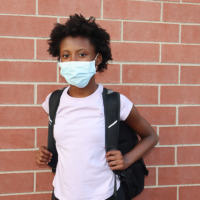Risk factors
-

How common and costly is persistent health anxiety in young people?
Health anxiety – characterized by excessive and impairing worry about health issues1 – has been minimally described in childhood and adolescence, and longitudinal studies are lacking.
Read more -

Does having both ADHD and irritability symptoms in childhood predict mental health outcomes in adolescence?
Attention-deficit/hyperactivity disorder (ADHD) symptoms combined with high levels of irritability during childhood is a significant predictor of subsequent mental health problems and suicidality in adolescence, according to findings from a new study.
Read more -

Results of the ACAMH Awards 2020
Congratulations to all winners and nominees of the ACAMH Awards 2020.
Read more -

Children with low language ability are at risk of a poor health-related quality-of-life
Ha Le and colleagues have examined the association between low language ability and health-related quality-of-life (HRQoL) in an Australian community-based cohort of 1,910 children assessed throughout childhood.
Read more -

Insufficient sleep during adolescence might pose a risk for later depression and anxiety
A new study published in the Journal of Child Psychology and Psychiatry has found that young people who have poor sleep quality and quantity might be at risk of poor mental health later in adolescence and early adulthood.
Read more -

A machine learning approach identifies unique predictors of borderline personality disorder
Researchers in the USA have identified critical predictors of borderline personality disorder (BPD) in late adolescence, using a machine learning approach. Joseph Beeney and colleagues harnessed data from a large, prospective, longitudinal dataset of >2,400 girls who were evaluated yearly for various clinical, psychosocial and demographic factors.
Read more -

Depressed mothers and their offspring differ in terms of health risk profiles and allostatic load
Allostatic load is essentially the “wear and tear” that accumulates in the body in individuals exposed to chronic stress. Because some patients with psychiatric disorders have a shorter lifespan than their healthy counterparts,1 some researchers have suggested that there might be a link between disorders such as depression and increased allostatic load.
Read more -

Do sex differences affect ASD symptom severity scores?
Researchers in the USA have investigated whether standard diagnostic assessments for autism spectrum disorder (ASD) are biased against girls.
Read more -

City living and psychosis: Unpicking an old question using new data
Decades of research point towards a role of urban upbringing in mental health problems, particularly psychosis. Leading theories often refer to the “stress of the city” as a driving factor. Developments in fields spanning geography to genetics call for renewed attention on the topic.
Read more -

Is brain circuitry linked with early symptoms of autism spectrum disorder?
Researchers in San Diego, USA, have studied the relationship between brain network connectivity and emerging autism spectrum disorder (ASD) symptoms in toddlers aged 17-45 months with (n=24) or without (n=23) ASD.
Read more